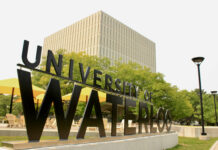As of this coming spring term, UW is increasing international student tuition by almost 9.2 per cent to stay competitive with other universities across the country.</p>
The number is almost 3.9 per cent higher than the average national increase in international tuition, according to Statistics Canada, to keep up with other leading universities in the country and not undervalue a UW degree.
Ian Orchard, the vice-president academic and provost, said that after looking at the data from across Canada “we discovered that over the last few years these other universities have been raising tuition more than Waterloo had.”
According to Orchard, the university was “undervaluing” the value of a UW degree.
“We believe our degree is as good as University of Toronto, it’s as good as Queen’s, it’s as good as UBC’s. And when we looked at the data we were considerably lower than them,” he said.
“I thought it was very high, and I thought it was very unfortunate,” Stephane Hamade, Feds VPED said. “I was surprised that it wasn’t communicated better to students.”
“Right now it’s, I think, pretty clear that they’re paying for more than potentially the cost of their education,” Hamade added.
Orchard, however, said “We have a little bit more room on the international [tuition] to charge what we believe is the true cost of education.”
The decision to increase international tuition was made back in February, but many students did not find out about the increase until March when spring fees went live on Quest.
Ian Orchard said he “fully [acknowledged they] can do a better job at communication.”
“I think that very next day there was a daily bulletin on it that listed all of the tuition, domestic and international, so it is out there, but maybe we have to do some more direct communication,” Orchard said.
Despite the increase in international student tuition, Orchard does not think the increase will affect the number of international students who choose to come to UW. Where the tuition rate for international undergraduate students has increased three times faster than tuition for domestic students in recent years.
He believes that the type of student that chooses to come to UW sees the value of a Waterloo degree “as opening doors throughout the world.”
Although Ontario’s three per cent cap on tuition for domestic students can be limiting, Orchard does not think international tuition should be regulated.
“Whether it’s government funding, whether it’s tuition, it’s people in Ontario paying that, and the citizens of Ontario should not be subsidizing international students to come to university and get a Waterloo degree,” he said.
In contrast, Hamade said deregulation of international student tuition can cause some problems for international students.
“I think accountability and predictability are really important things, and certainly a student has no idea right now how much it’s going to increase next year,” Hamade said.
“There’s very little financial aid other than the emergency bursary that’s available to them. And I think that’s obviously a very big concern.”
However, both agree government should play a greater role in funding and subsidizing university tuition.
“We’ve been arguing with the government that the funding we receive from the government is not sufficient to educate our students,” Orchard said. “We don’t believe the funding from the government is at the level it should be.”
“I think it’s really important that the universities are more invested in by the government,” Hamade said, “So that the universities don’t feel the need to treat international students as cash cows.”































